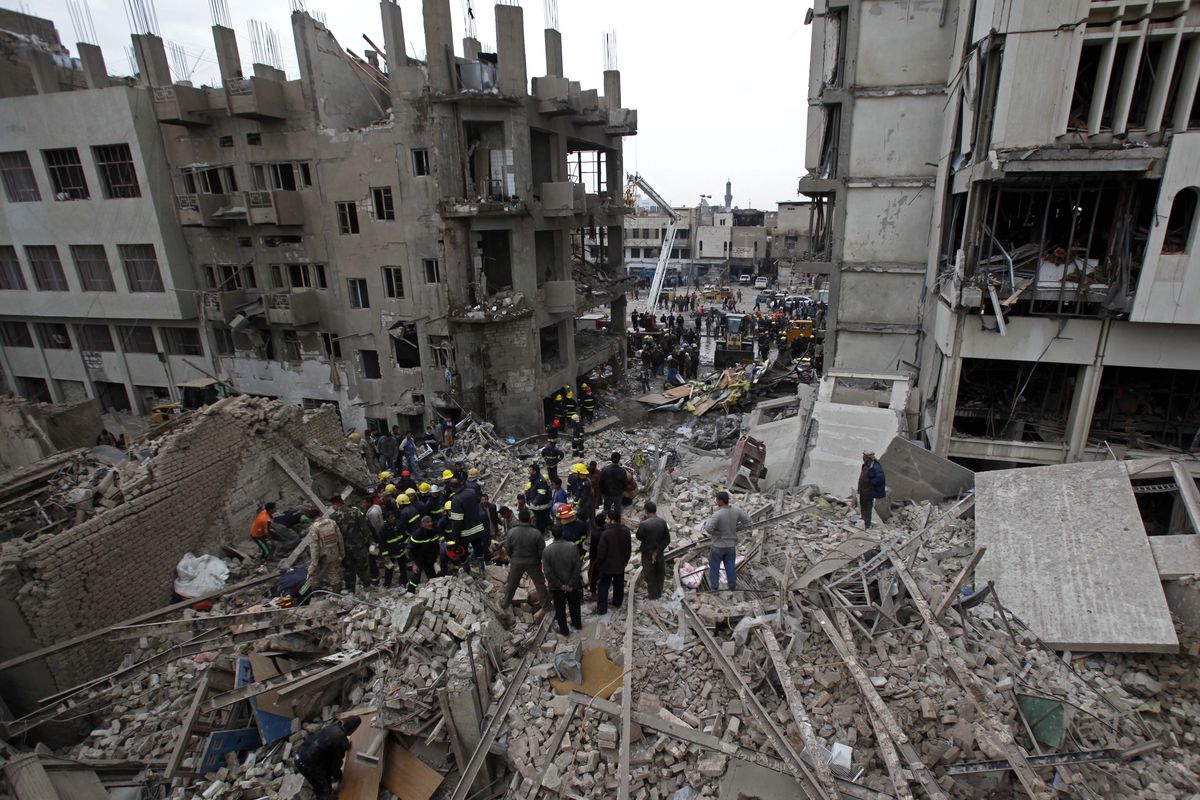Deadly explosions rock Iraq’s capital
Says rescuer: ‘First it was bloody Wednesday; then bloody Sunday; now it’s bloody Tuesday’

BAGHDAD – As Iraqi officials prepared to announce a date for long-delayed national elections, car bombs detonated at government buildings and in crowded Baghdad streets Tuesday, killing at least 127 people and wounding nearly 500 more.
The attacks on state institutions appeared aimed at further eroding the Iraqi people’s faith in the political process, which many already viewed with deep skepticism.
The morning explosions shook the eastern and western sides of the city over a span of about 30 minutes, gutting portions of the city’s main courthouse on the western side of the Tigris River and other buildings. An ambulance, packed with explosives, detonated at a checkpoint for the makeshift offices of the Iraqi finance ministry, which had been forced to move after a bombing in August.
Another car bomb exploded at a busy intersection in eastern Baghdad after a U.S. convoy passed by, according to police. A separate car bomb exploded outside the gates of a technical institute in the southern Dora neighborhood after a police patrol drove by.
Attack ‘for the elections’
Standing in the smoldering parking lot of the burnt out courthouse, an employee named Jawad, who survived the last major bombing in Baghdad in October, displayed the red cuts lining his forehead and nose from debris that blew into his office.
“This (attack) is for the elections,” he said, clutching the charred license plate from his car. “Until the elections are held, Iraqis will be killed.”
It was impossible to know who was responsible for the bombings. Some believe political blocs in the government could be sponsoring attacks in order to bring down Prime Minister Nouri al-Maliki. Others believe Iraqis, resentful of the political order installed by the United States, including some army and police officers, are intent on overthrowing Iraq’s current political system.
SUV explodes
Not far from Jawad, rescue workers dug with shovels and hacked wires with axes until they uncovered the corpse of one of the men who had been lined up outside waiting to apply for a job. It had been close to 10:30 a.m. when a blue sport utility vehicle tore through the checkpoint into the courthouse’s parking lot and exploded, tearing down a corner of the building, smashing windows and bursting the building’s metal roof.
“God is great, God is great,” the workers shouted, in mourning, as they pulled out a corpse and zipped it into a black body bag. They stumbled with the body strapped to a stretcher, walking through the maze of torched cars, hills of mud, and fallen walls.
Watching the procession, another rescuer yelled in reference to the last two major Baghdad bombings: “First it was bloody Wednesday; then bloody Sunday; now it’s bloody Tuesday. Soon they will cover every day of the week.”
Besides coming ahead of the election day announcement, the carnage preceded the arrival of international oil executives to Baghdad this weekend for a conference auctioning off stakes in 10 oil fields, which the government hopes will attract desperately needed investment that could help create jobs and stability.
Politicians lashed out at each other over whom to blame for the third major attack on government institutions in less than four months. A pair of car bombs in late August badly damaged the foreign and finance ministries. A pair of car bombs in late October killed at least 155 people in addition to practically destroying Iraq’s ministry of justice, municipality ministry and Baghdad’s provincial council.
Elections set for March 7
Officials called Tuesday’s attack a direct response to parliament’s adoption of an election law late Sunday night, after an acrimonious debate over the number of seats in parliament for different groups. The dispute delayed elections, which government officials announced Tuesday are now scheduled for March 7.
The U.S. ambassador to Iraq, Christopher Hill, and U.S. commanding general in Iraq, Ray Odierno condemned the violence Tuesday and vowed to support Iraq’s march to elections. The U.S. military is looking to start a drawdown of its estimated 115,000 forces this spring to 50,000 troops by August.
Al-Maliki described the explosions as an assault on the political process.
“The timing of the cowardly terrorist attacks … aims to create chaos … to stop any progress in the political process and to disrupt the elections,” al-Maliki’s office said in a statement. He blamed Saddam Hussein’s Baath party and al-Qaida for the blasts as the government has done after the previous attacks.